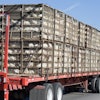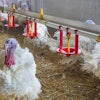At the recent Animal Health Investment Forum in Kansas City, Mo., VaxLiant introduced a new solution to developing a rapid-response vaccine to help combat avian influenza.
One of 13 companies invited to present information at the forum, VaxLiant showed how its adjuvant, ENABLTM, can be combined with gene-sequenced DNA to create a stable delivery format for commercial vaccines. The August 12 publication of the U.S. Department of Agriculture (USDA) Center for Veterinary Biologics' guidelines for licensing production platforms using recombinant DNA makes bringing to market an affordable ENABL vaccine to combat this highly contagious viral disease possible within the next three years.
"The new [Center for Veterinary Biologics] guidelines identify the steps to take to receive approval of a 'production platform' - the process of consistently, safely manufacturing vaccines using recombinant DNA technology," says Steve Schram, co-founder of VaxLiant. "This means there is now a pathway for our ENABL vaccine platform to become USDA-licensed - which can lead to vaccines for [avian influenza] and other emerging diseases that are more practical and affordable than today's options, in about one-third of the time. That's why we were at the Investment Forum, inviting companies to consider an exclusive strategic partnership to develop a truly innovative [avian influenza] vaccine."
"We believe we're the only company to have developed a DNA platform that works and is practical for broad application to animal health, and it's because we have an adjuvant that allows it to work," says Timothy Miller, Ph.D., VaxLiant co-founder. "Research shows that ENABL allows the DNA component of an [avian influenza] vaccine to remain intact and stable. And, it provides higher levels of effectiveness against the [avian influenza] virus using about 70 percent less antigen, finally making production of an affordable vaccine possible to benefit poultry farmers everywhere."
According to Miller, a production platform using DNA technology is a breakthrough that can be used to fight not only avian influenza, but also other devastating transboundary diseases, including foot-and-mouth disease and African swine fever.
"Producing vaccines using the ENABL platform does not use live-virus or animal-origin material, which means manufacturers can produce vaccines to combat these highly contagious diseases safely," says Miller. "This also means vaccinated birds and animals can be distinguished from non-vaccinates that are harboring the actual virus, so countries could finally allow the import and export of livestock and poultry given vaccines that include ENABL."
ENABL is already available in 15 ready-to-use formulations for use in both traditional and new vaccines for cattle, pigs and poultry. For more information about creating a strategic partnership with VaxLiant to develop an avian influenza vaccine or discuss other vaccine-development opportunities, call +1.800.533.8617 or email [email protected].

















